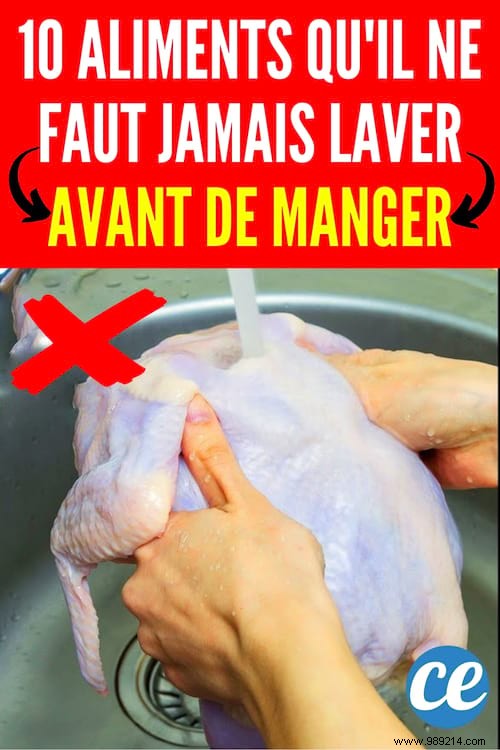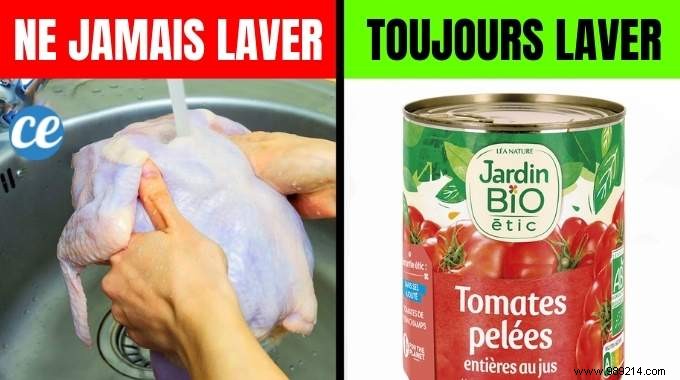
Today I show you what foods he does never wash...
...and those, on the contrary, that must be washed before eating.
Because at the risk of surprising you, not all food must necessarily be cleaned.
While it is natural to remove pesticides from fruit, other foods should absolutely not be put under water!
It's useless at best, at worst it can have the opposite effect to that intended.
But then, how do you know if this or that food is to be washed or not? Well I tell you all about it.
Find out what foods to wash and what not to wash before eating.
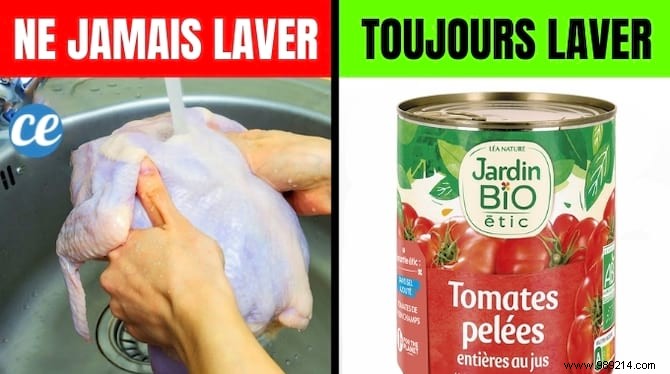
Washing food before cooking is an almost mechanical reflex.
We may feel more reassured by doing this, especially in this Covid period.
And it's not the National Food Safety Agency that will contradict you.
Thoroughly washing and wiping fruits and vegetables before consumption allows them to eliminate viral particles.
Beyond this specific fact, it mainly eliminates bacteria, dirt and pesticides potentially present.
However, not all foods necessarily meet this rule.
Not all are washable for 2 main reasons:
- Firstly because washing certain foods can seriously reduce their taste and make them bland.
- But above all, because putting certain foods in water can cause bacteria to proliferate and cause poisoning!
So let's see together what foods it is to avoid making these mistakes in the kitchen:
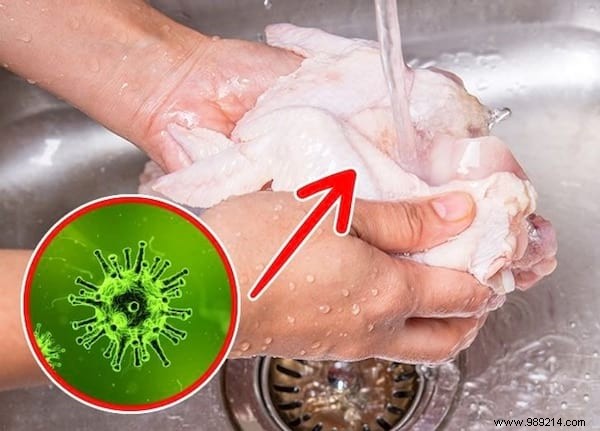
You would think that washing chicken or other white meats is a good thing.
By doing this, we think that all bacteria and other infections disappear.
In fact, it's just the opposite.
The water used to rinse poultry is not hot enough to kill bacteria.
It only spreads harmful bacteria to kitchen surfaces and even to your body.
And when you prepare other foods on those same surfaces, you're doing what's called cross-contamination.
In other words, bacteria from one food contaminate another healthy food.
You should know that raw chicken meat is very sensitive and contains a lot of bacteria, especially campylobacter.
Multiplying bacteria can therefore be quite dangerous, as a vector of infections such as salmonellosis or E. Parcel.
These very tough pathogens can make you very sick.
Prefer to clean chicken meat with lemon or vinegar.
It is also effective and it kills bacteria.
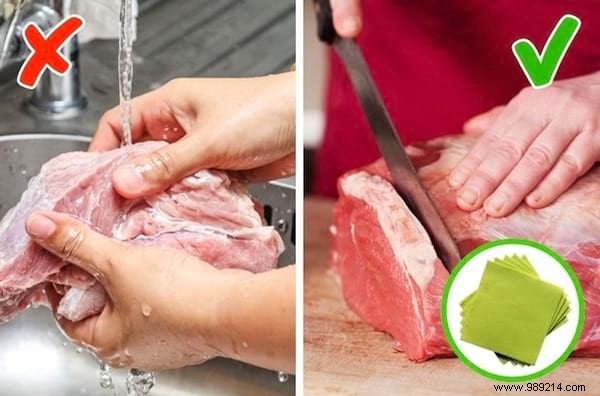
For the same reasons as chicken, fresh meat should never be washed.
This produces the same effects as explained above, i.e. the proliferation of bacteria on the meat.
So don't put water on your red meats, pork, lamb, veal...
Before cooking, simply use napkins to remove the meat juices from its surface.
Then wash your hands with soap and you're done.
And then, rest assured. Once sufficiently heated, the bacteria present are eliminated.
Ah yes; another reason why meat should not be washed is that it adds moisture.
This humidity creates steam during cooking, which alters the taste.
In short, for healthy meat and perfect searing, keep the water out.
And if moisture is still present, remove the excess by passing the meat through a paper towel.
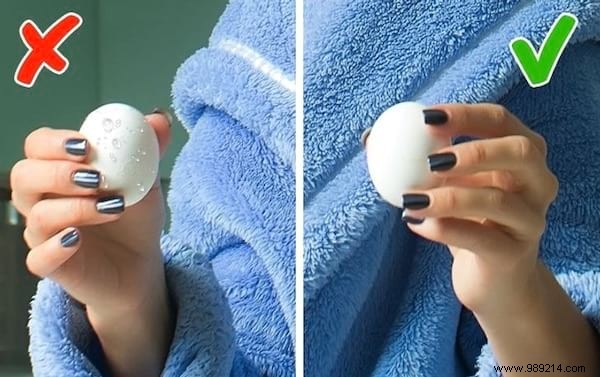
Much for the same reasons as for meat, washing eggs is really not a good thing to do!
Everyone thinks that pouring water on the eggs is harmless.
Well no ! The eggshell is porous and therefore not 100% airtight.
And then passing the water over the eggs removes the invisible protective film that covers them.
The egg then becomes vulnerable to bacteria that pass through the shell.
This leaves room for infections like salmonella to develop.
If you really want to clean the eggshell, because it's too dirty, do like me instead.
I take a simple little brush and gently rub the egg with it.
I do this before I put the eggs away or even before I crack them open to eat.
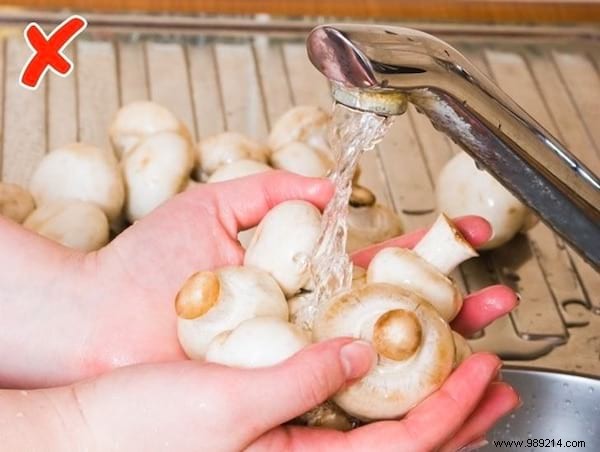
When you buy freshly picked mushrooms, it often happens that they are full of soil.
And obviously eating dirt is not really what we prefer.
So the first thing we do after buying them is to wash them thoroughly under running water.
Fatal error!
When mushrooms come into contact with water, they react like a sponge:they fill up with water.
Their texture then becomes spongy and their taste bland.
Not terrible when you have to cook them.
In addition, once washed, moisture accelerates the rate at which mushrooms begin to deteriorate.
Be aware that most store-bought mushrooms are pasteurized.
This means that they are quite clean and can be eaten.
If you really see too much soil, cut off all or part of the stalk and gently brush the head.
Use these tips to learn exactly how.
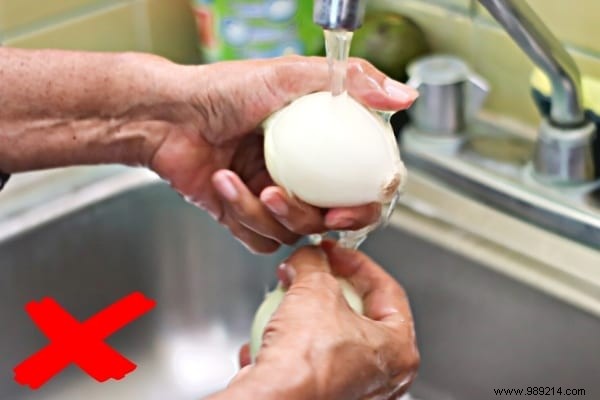
The advantage with onions is that they are covered with a fairly thick skin.
This fully protects the inside of the onion.
So once you have cried while peeling them, no need to pass the flesh under water.
Optionally, you can rinse them a little to reduce their pungent effect on our lacrimal glands.
What I am talking about is as valid for onions as for garlic or shallots.
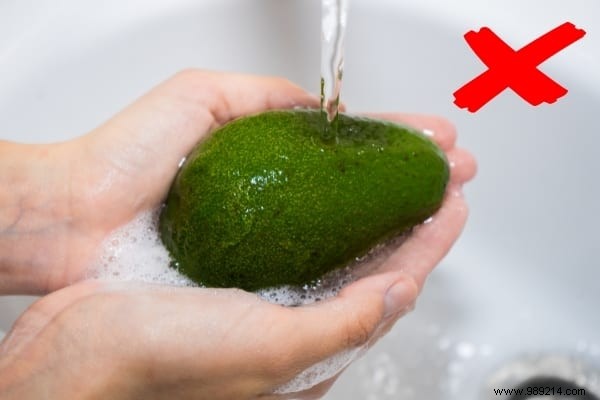
The skin of the avocado is perfectly hermetic to external aggressions and pesticide residues.
Therefore, there is no point in running this fruit under water.
And then, we all know the fragile aspect of his flesh.
If water gets inside the avocado and you put it in the fridge...
...you can be sure to see it darken twice as fast!
Once the skin has been removed and the pitted avocado, you can eat it directly without any problem.

It may seem obvious, but it's better to say it.
Fruits with a sufficiently thick and inedible skin are not to be washed.
Their flesh is totally protected from microbes and pesticides.
I am talking for example of kiwis, oranges, bananas, melons or mangoes.
But if you're the type to clean everything anyway, don't worry.
Passing these fruits under water does not generate any infection.
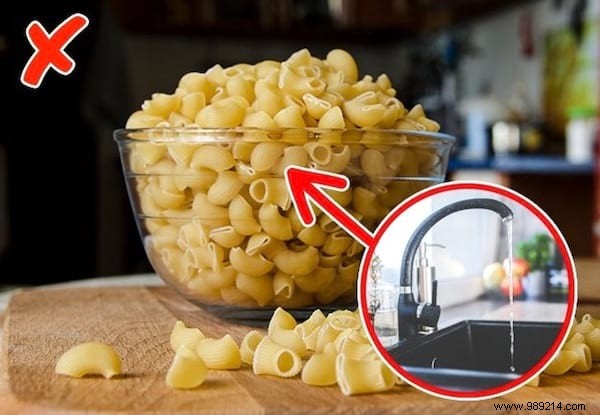
If you think of washing the pasta in cold water, stop this bad habit immediately.
Do you know why?
The water removes the starch which is very important from a culinary point of view.
It helps your sauce cling to your noodles and adds flavor.
Packaged pasta is a dry product and is highly unlikely to contain bacteria.
At worst, you can wash the pasta after cooking in case you want to use it in a salad for example.
Otherwise, skip this pointless rinsing step.
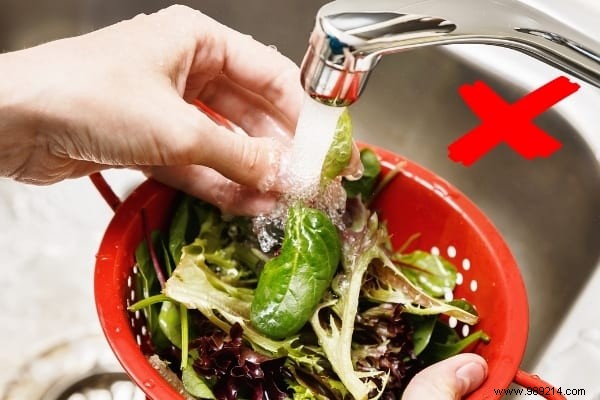
Sachet salads and pre-cut and packaged products (carrots, celery) are pre-washed.
They are ready to be eaten and therefore there is no need to come back to them.
If you wash them again, you may even contaminate them with bacteria present in your home!
In addition, this type of product is generally triple washed; so consume them as they are.
And remind me of one thing; you chose them for their practicality, right...?
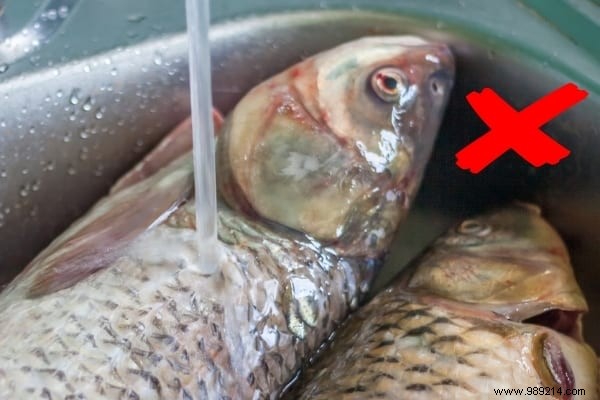
As with poultry and raw meat, avoid washing raw fish.
This is to reduce the risk of spreading bacteria already present in your kitchen.
Instead, buy gutted and scaled fish from a good fishmonger.
Wash your hands well and thoroughly clean the surfaces of your kitchen work areas.
These simple precautions are your best bets for preventing foodborne illness.
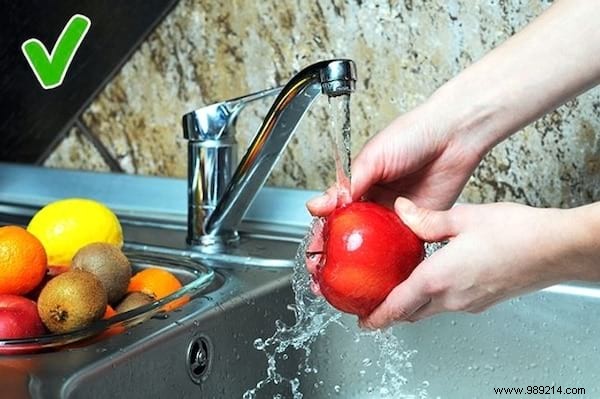
Do you have clean, shiny fruits and vegetables with edible skins in your basket?
That doesn't mean they shouldn't be washed!
On the contrary, fruits and vegetables, especially when they are not organic, are loaded with pesticides.
Rinsing them with water is therefore very important so as not to swallow the residues of harmful products.
However, do not use any soapy product to wash them.
Indeed, the skin of fruits and vegetables being porous, the product used could be absorbed.
Simply pass them under water and dry them with a clean towel or paper towel.
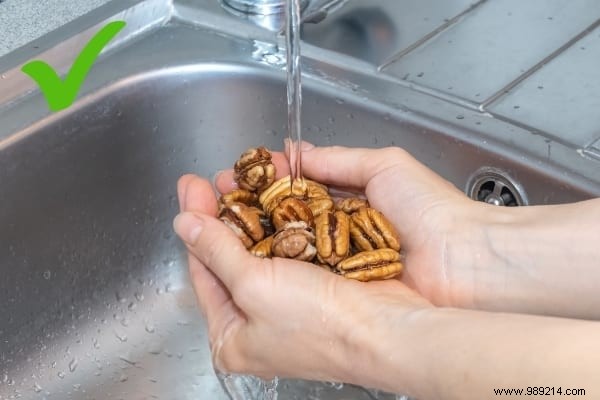
You should always wash the nuts, especially if they are already shelled.
You never know for sure where they were stored and how they were transported.
Also, washing helps get rid of the phytic acid that fresh nuts contain.
This acid serves to protect the nuts against parasites, but it can harm our organism.
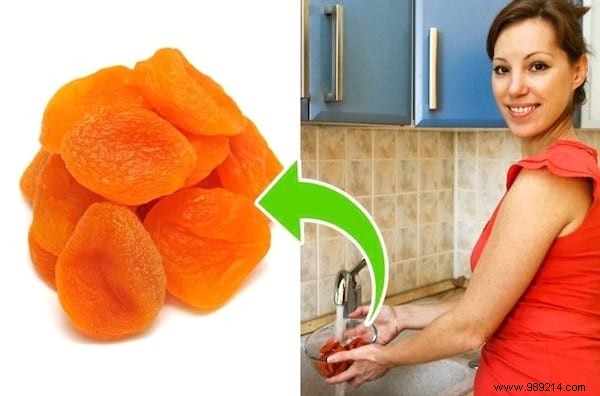
This type of food is considered one of the dirtiest.
This is especially true for fruits that are sold by weight and in bulk.
And even if you buy them in a nice package, you have to wash them first.
This requires soaking them in water for a few hours.
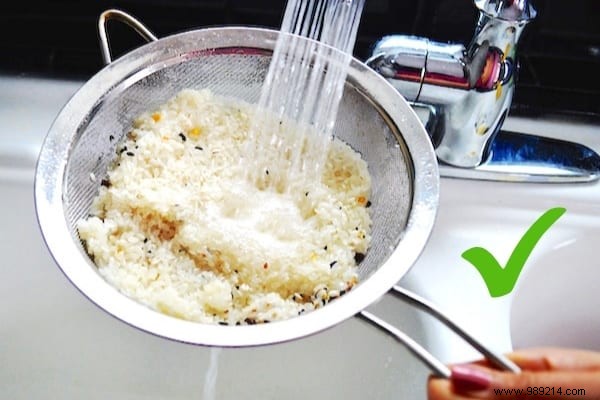
Rice lovers will probably tell you that it is a sacrilege to cook rice without washing it first!
In reality, rinsing the rice before cooking it depends on several factors.
It used to be common for manufacturers to add talc to rice to give it a whiter appearance.
It was then necessary to rinse the rice to remove the residue.
Although this process practically no longer exists today, some imported rice can nevertheless still be processed.
Washing the rice before cooking also removes some of the natural starches that coat it.
This prevents the rice from sticking when cooked and results in a lighter, fluffier grain.
On the other hand, do not wash short-grain rice if you are making risotto, for example.
Rinsing it has a negative effect on the creaminess of the dish.
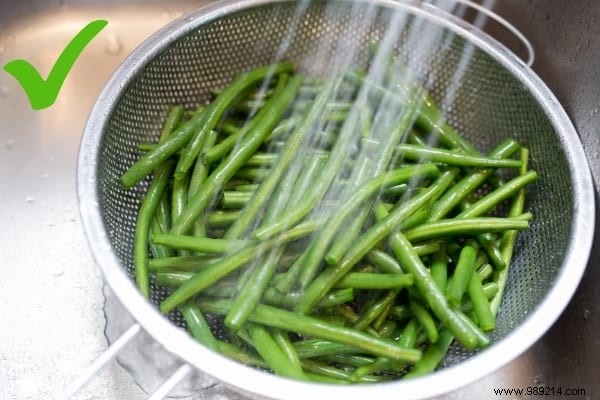
We all have a few canned vegetables in our storage room just in case.
Beans, chickpeas, peas, salsify... these preserves are very practical.
Be careful though, you should not eat these foods as soon as they come out of the can.
The liquid in which they are stored is usually loaded with sodium.
It is therefore necessary to completely drain the contents of the can and then rinse thoroughly.
This removes salty residue.
If you plan to sauté or roast them, especially dry them (with a paper towel) before cooking.
This prevents it from releasing steam.
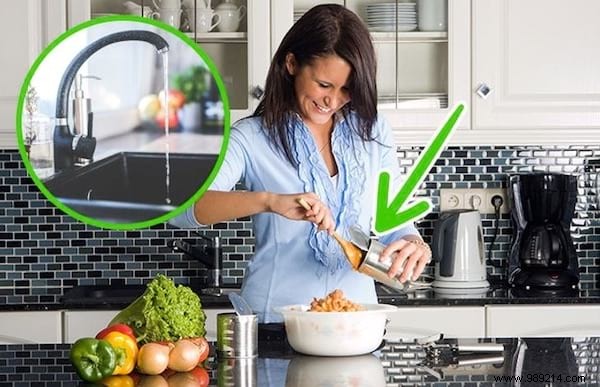
Have you ever worked in a grocery store or store warehouse?
If so, you know how dirty cans can be when they arrive.
So please do a good deed for your body.
Wash the top of the can before drinking your drink at least where you put your lips.
Because the tops of cans are often covered in dust, bacteria and whatever else.
And if you can't wash the can, at least wipe the lid thoroughly.
Pass a damp paper over it and pour the contents into a glass.
It's the same for canned tomatoes.
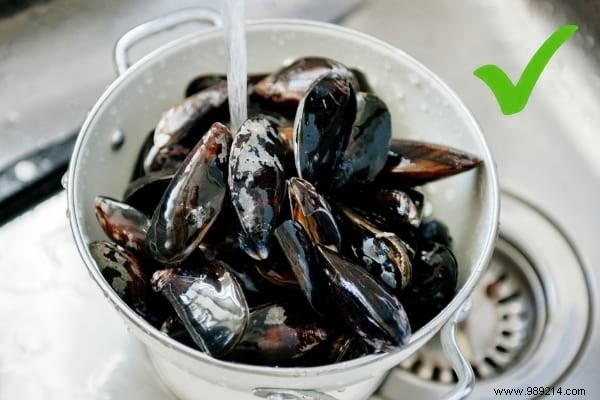
It is not necessary to wash raw fish, it is necessary to rinse shellfish, clams and mussels.
If you don't, you'll eat tiny grains of sand and gravel!
Speaking of mussels, I have a little tip for you on how to clean them.
To make sure they are free of sand or silt, follow these steps.
Before cooking them, rinse them thoroughly under running water to remove as much sediment as possible.
Then put them in a pan of cold water, adding a little salt.
Place the pan in the refrigerator for 30 minutes and stir several times in the meantime.
Take the pan out of the fridge and remove the molds with your hands.
Check the bottom of the pot; it's full of sand!
Your 30 min wait was not done for nothing...
Finish the job by rubbing the outside of the mold to get rid of any protruding beards.
Your molds are then perfectly prepared and clean.
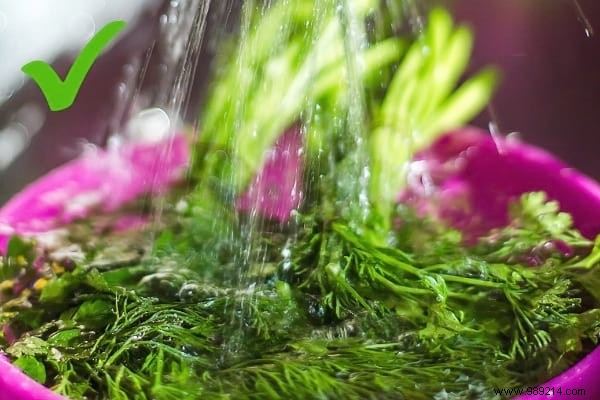
No matter where the fresh herbs come from (grocery store, garden, market), they should be washed thoroughly.
Not only should this be done before cooking them, but also before putting them in the fridge.
Indeed, herbs contain dirt that you surely don't want to eat.
The small bouquets can be washed by rinsing them with fresh water and running water.
Then shake them out and pat them dry with a paper towel.
You can also use a salad spinner to remove excess water.
For bigger bunches, fill the sink with cold water and add the herbs.
Gently run your hands to dislodge dirt hidden in the leaves.
If there is a lot of dirt, simply repeat the washing operation and then dry everything.
